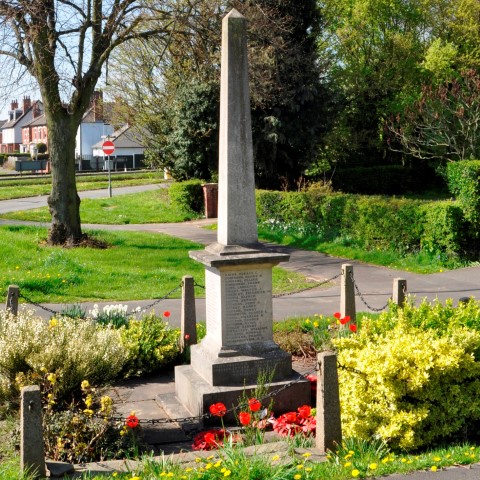A Standard of Living – Phyllis Wymer
As the 20th century advanced; working outside the home assumed increasing importance in a woman’s quest for an acceptable standard of living as well as a key factor in basic economic survival.
Phyllis Wymer worked as a welder in the years following the outbreak of the Second World War to sustain her single-parent family after the desertion of her husband and the premature death of a partner.
The 1970s found Phyllis’s daughter, Pamela Hooley, presiding over her own business as a greengrocer in Borrowash, with a family lifestyle that was far removed from a hateful childhood during which scavenging for bits of coal in a woodyard to heat the house was not unknown.
But relative financial security was not to prove a buffer against all of life’s evils.
After 1945, there were to be no more World Wars, but the 20th century contained other more insidious threats
The steady job that Pamela’s husband Roy would return to throughout his married life was the foundation of a comfortable lifestyle for the couple and their daughters Suzanne and Elaine.
It would eventually kill him.
Pamela June Wymer was born at Derby City Hospital in 1938. Her father, Edward was a brick-layer and the family home was a small terraced house in Depot Street, Normanton.
When Pamela was aged just three, Edward disappeared:
He ran off with a woman – well, women, really. He was a womaniser and was last heard of in Italy.
It fell to Phyllis to provide an income and she was glad of her welding and riveting job at the Carriage and Wagon works in Litchurch Lane.
Pamela was educated at St Chad’s and St James’ Primary Schools until she was 10 years old and moved with her mother to Burton on Trent.
Again, Phyllis found work as a welder; this time with Stokely Enamels.
The company produced metal tops for washing machines and Phyllis joined seams together.
She was bringing money into the household, but life was far from easy.
Mum began a new relationship with a man called Mr Simms and we went to live with him in a tiny cottage in Burton. His father was ill and old and we had to look after him too. Mum wasn’t divorced – she didn’t know where Dad was. He had just disappeared.
Living conditions were primitive; the cottage had neither running water nor electricity and soon there was another mouth to feed; Pamela’s sister, baby Valerie.
When Valerie was barely a year old, Mr Simms died of peritonitis following a burst appendix.
Shock, stress and hard, thankless, work must have taken their toll. Before Pamela was fourteen, her mother had died of a stroke.
The two girls were now orphans in all but name – and homeless.
Help was at hand – in the form of Louie Taylor, the girls’ grandmother. Pamela and Valerie moved to her home in Allenton’s Bingham Street and their living conditions improved:
It was a council house made from steel and it was so much nicer.
Pamela’s life became more settled.
After completing her education at Allenton Secondary Modern School, she began work as a counter assistant at Hunt’s General Grocery Shop on a salary of £1: 8 shillings per week.
Everything was still on rations; we had to weigh out every single item and put it into bags.
Office work at the Co-op Laundry in Victory Road paid more, but Pamela’s third job as a piece worker with Wild and Brown in Ascot Drive was best of all.
The money was good – I took home £3. 50 shillings a week as a weaver but it was a 40 hour week so I earned it! But it was near to home and I could cycle to work. Getting jobs was different in those days; you could go from job to job on recommendations from friends without applications or CVs like you have now.
When she was 20, Pamela met her future husband, Roy Hooley.
Social life for young people tended to follow a predictable pattern:
At the weekend we all went to the Majestic cinema in Chaddesden – looking for talent, really!
After the cinema, it was off to Derby to hang around the market place. You couldn’t do that now – you’d get locked up – but it was what we did then.
Roy Hooley when he was Head Choirboy at St.Werburgh’s Church, Spondon.
The Salvation Army used to sing there, and we’d join in – that’s where I metRoy.
Roy Hooley, from Spondon was a fitter at the railway’s Derby Loco works.
After a three and a half year courtship, he married Pamela and the two began life as a couple living back home with Grandma.
The arrangement seems to have worked well – and anyway, Roy was mainly away from home on RAF wartime service near Blackpool.
On his return, they moved to their first independent home – a council maisonette in Chaddesden.
The early years were a time for home building.
In 1962, aged 24, Pamela gave birth to her first daughter Suzanne Yvonne, and the family was complete with the arrival of Elaine in 1966.
Mr and Mrs Hooley moved onwards and upwards; exchanging the council maisonette for a three bedroomed house in Alvaston’sBarrett Street and eventually buying their own three bedroomed detached property inSandringham Drive, Spondon.
It was a far cry from the primitive cottage inBurton – but like Phyllis, Pamela was prepared to work hard to achieve her goals:
We saved up for the house – and I went back to weaving.
I looked after the baby in the day and then Roy took over so I could go to work at night.
In 1970, Pamela Hooley went into business as a greengrocer in Borrowash, embarking upon a career far beyond the dreams of her mother Phyllis Wymer who had struggled to make ends meet before dying young and poor.
The new business was situated in Victoria Avenue and the family lived on the premises. Roycontinued working as a fitter and combined it with new responsibilities, managing a caravan park in Spondon.
Pamela took charge of the shop.
When I first went in there, it was like going into a dolls’ shop; there was nothing on the shelves! It was empty; they’d let it run right down; it was really desperate. It was running as a grocer’s when I bought it. To start with, there was nothing in that shop and I gradually built it up. When I finally came out, I was taking a four figure sum a week!
She has fond memories of 1970s Borrowash:
It was lovely; a gorgeous village to live in – it’s not as nice now as it was. There was the Women’s Institute; the Girl Guides; the Boy Scouts; plenty for the kids, plenty going off at the schools all the time in the evening and the people were lovely. Friendly people!
It was an era before extensive house building and the village had strong rural and farming links:
Mrs Armstrong used to sell eggs and Archer’s farm was on the main road.
Then you’d got the goat farm. They kept goats by the doctor’s. People used to go buying goats’ cheese and milk; people who were on special diets.
The reputation of the local butcher rested on more than the quality of the meat:
My shop store shed was at the back of Coates’ slaughter house and nobody would go down there when it was killing days! I know pigs make a row when they’re being killed, but I think those pigs knew about it! They did used to squeal!
Pamela remembers that amongst the local residents were Derby County legends John O’Hare and McGovern – he used to live over the back here and in Ockbrook you had Alan Hinton.
Other villagers gained reputations as characters such as
Mr Allsebrook, the old chap who lived up the main road; he was the one whose house burnt down.
To look at him, you’d think he was an old tramp, poor old devil, but he wouldn’t accept help. He was a medical doctor.
And a doctor lived at the end of the bypass in the bungalows where that chap attacked a bloke in the garden.
He kept his lawns just like Wimbledon!
And there was another doctor; Dr Smith. His wife Eileen worked for me
It was a friendly community, but making a go of the business was an all consuming task:
I didn’t get a chance to socialise – it was work all the time – I was always working. I never had time off! I used to try and just get a couple of hours probably if the girls came in on a Wednesday. I was open from eight o’clock till six, but we always got customers in afterwards; they hung about; they never thought you had anything else to do but to look after them! I shut shop on a Sunday afternoon – that’s when I tried to get all my work done. I stripped all my bacon machines and everything like that and they were all clean – but if the gates were open, people used to come round and say, ‘Do you think I could just have so-and so?’ And there I was, trying to do things!
Pamela’s social life – such as it was; occurred at work where a welcoming and pleasant manner was essential to business success.
In a shop it’s not what you sell! Actually, you sell yourself to people. If you’ve not got the personality to be with people, you’re no good! When they say you buy goodwill, you don’t buy goodwill at all – you make your own goodwill! But I’ve always liked people. I like working with them and I can handle people very easily.
We used to serve them with bacon and keep everything fresh in the fridge on trays until it was ready to go out onto the counter. I’m not bragging, but our shop was always full! In fact, they’d be queuing outside!
The customers said it wasn’t like coming into a shop because we all had such good laughs! It was wonderful – they’d say ‘you can come in here feeling ever so sad,’ and they all used to go out laughing!
Team work and the personal touch made the difference at Hooley’s.
Pamela struck up a good rapport with her employee, Eileen Smith (we were both Geminis, we both matched and we could banter with people very well you know) but the friendly atmosphere was partly due to working methods of a by-gone age:
I hadn’t got any tills. We all served together. Decimalisation came in and we were all there, working it out!
To start with, nobody could get the hang of it and they kept saying ‘Oh, we’re paying six shillings for that,’ – but it was much easier to work out really, easier than the old half crown and two shilling piece.
But I loved it all. I loved people and I really loved every single minute in my shop.
The 1970s High Street differed in other ways from today’s retail environment.
Pamela described herself as a general greengrocer.
Today everybody sells everything, but in those days, you were bound by what was in your lease and you had to stick to your trade. You couldn’t sell wallpaper at the wool shop!
Trading in a village also meant that suppliers were local.
Milk came from Mr Molson on the main road; eggs came from Heanor and cheese was sourced from a Spondon dairy in Sitwell Street.
Pamela dealt with all the suppliers herself:
I fetched greengrocery from Nicholls’ in Derby, on the market. John Bartram from Cole Lane delivered all the heavy stuff like potatoes. I got pies from Pars and Robirch and Wonder Loaf from Pearce’s bakeries.
It was a bustling street scene and shops were known by the name of their proprietors:
Frank and Hilda Tyler’s, Newsagents; Mr Coates the Butcher; Mary Gent’s Wool Shop; Cathleen Wyman’s Drapery; Ron Newton the Barber; Geoff Alsop’s Carpets; Simms’ Electrical; Len Wheatley’s Hardware…
During Pamela’s tenure; the arrival of Grandway’s supermarket caused a stir but Hooley’s rose to the challenge!
If you get a supermarket that comes near you, it can do you a favour! I’d tell anybody!
Your produce is a lot fresher than theirs; theirs is hanging about quite a while. My trade picked up with the supermarket; they can’t beat fresh stuff. Mine was fresh every day – they couldn’t beat that! I hadn’t got masses of freezers like the supermarkets so my stuff had to go every day and what didn’t, like green tomatoes, the ladies bought them for chutney! I never wasted much at all. I can’t even remember it opening, to be honest!
Eventually, the shop was sold; Roy returned full time to his job as a fitter on the railway and Pamela took a new post as a Quality Control Manager at the GIC factory in Borrowash:
It was lovely – a wonderful place to work and it was a family-owned business. I worked there for a number of years. It was a complicated job – I had to return overalls that needed repairs or hadn’t been attended to. I had a lot of paper work to do.
It got taken over by a big Northern company. They just got rid of all the orders and killed it, really.
Pamela stopped working at sixty, and Roy anticipated a lively retirement after working at the railway for 45 years.
My husband was a big bowler and a very active man. He bowled for a club onMarkeaton Street and then played for Long Eaton Town. He played for the Derby VPs and Derby County; the City and the Lincoln Imps.
But within ten years, he was dead.
Roy died from sustained exposure to asbestos doing a job that had contributed in such great measure to the standard of living enjoyed by the Hooleys and their daughters.
He and other colleagues were poisoned unbeknownst to them over many years in the course of carrying out their professional duties.
Roy was a very slim man and when he was younger, he used to go in the steamers. He had to go in there and strip it out – there was no ventilation. The fitters who had to do the damn job, putting it on and cutting it as well as ripping all the old stuff out – they weren’t protected in any way – no clothes or masks. Roy used to have a shower when he came home, but it was what he breathed in when he was there that did the damage. He was working with it every day – they didn’t know what a dangerous thing it was. They do now.
It was in sacks and all in powder form. It had to be mixed and it was the blue asbestos – the dangerous one. The white asbestos can work out of the system, but the blue can’t – it’s like barbs; it just sticks.
They didn’t know – the companies didn’t know how dangerous it was.
We were told forty years ago that he had thickening of the plaque on the lungs. We didn’t know why – and it developed and got worse.
At the end it was quick….
Shortly before his death, Roy started legal proceedings to claim compensation from the railway and Pamela has continued the action.
I didn’t know what to do, but it was wrong and the compensation acknowledges it was wrong.
Roy had a bit of retirement, thank goodness, but I feel cheated.
I wish he’d never worked on the railway.
Pamela and Roy Hooley worked hard all their lives to give their daughters a future.
Suzanne moved to New Zealand where she worked in the equestrian sphere before pursuing her present career as a teacher of autistic children.
Elaine is equally successful as a senior administrator at Derby College – but perhaps their resolve and determination owe something to a grandmother they never knew who worked as a welder to support her own young daughters.
Pamela’s professional success will have been a daily example to her daughters, typified by the fact that in Borrowash, thirty years after she shut up shop:
That shop’s still known as Hooley’s – they still call it Hooley’s even now…
But amidst family success and happiness, the tragedy of Roy remains:
They didn’t know in those days how dangerous and horrible it was.
It was like a lot of things really – they brought all these fantastic things out – and yet they caused all this damage….
Pamela Hooley’s words on the death of her husband, could serve as an epitaph for the 20thcentury.






